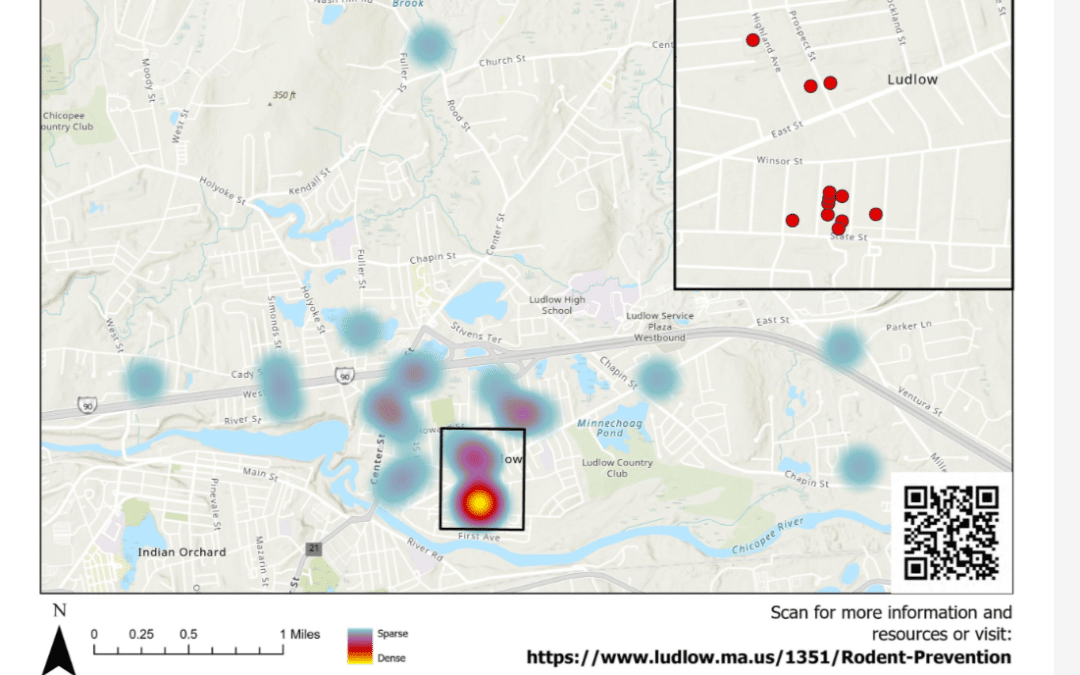Map of Ludlow’s rodent complaints in 2023.
Photo Credit: Town of Ludlow
LUDLOW — Ludlow has been experiencing an influx of rodent activity in the past two years. As the presence of rats and mice in backyards and trashcans has continued to be an issue for many in the community, the town released a statement urging people to take precautions on their properties, such as securing trashcans and reducing clutter.
However, residents have expressed their belief that the rodent issue stems from the renovation and construction at the 120-year-old Ludlow Mills, which are in the midst of transitioning to allow for reuse as housing, business and industrial spaces.
Reminder Publishing reached out to the Health Department and Town Administrator Marc Strange with some questions about the rodents, where they came from and how — or if — they can be eradicated. Health Director Paulina Matusik responded on behalf of the town.
Matusik said, “Rodents have always been and will always be present” because they are attracted to humanity and the waste people generate. “Our role as residents is to prevent the spread and infestation of rodents and control the population while being aware of their potential to be a vector for disease.” Rodents can carry and transmit hantavirus, leptospirosis, rat bite fever, and salmonellosis. Additionally, fleas, which carry their own set of pathogens, can travel on rats, providing them a method of entering homes.
A “hot spot” map on the town’s website shows rat complaints in 2023. The largest area of activity is in the neighborhoods to the east and northeast of the Ludlow Mills. However, Matusik insisted the map represented “a snapshot in time” and is not necessarily an accurate portrayal of where the rodents are most active or from where they originate. She did acknowledge, “Each time one of their habitats is disturbed (i.e., by construction work), they tend to be more visible.” Matusik reiterated that maintaining a sanitary property and eliminating possible food and water sources is the best way to address the issue. “We all can help and work together to limit the spread,” she said.
Matusik also urged residents to contact the Health Department if a rat is spotted, so they can be accurately tracked.
Meanwhile, with the recommendations for what people can do to stop the spread of rodents in Ludlow, the town is developing its own rodent management plan. In the press release from early June, Strange said, “Our approach to rodent management focuses on coexistence and environmental responsibility.” Ludlow Health Director Paulina Matusik noted in the press release, “Poisons and pesticides should not be used outdoors due to their potential danger to other wildlife and pets.” Likewise, Peine said the town’s approach is “sustainable and non-toxic to the environment,” but he did not provide details. The development of the rodent control plan is “a multi-stage process,” that is underway he said.
The following are the tips provided by the town for limiting the attraction of rodents to homes and properties:
- Secure trash and recycling: Use metal or heavy plastic containers with tight-fitting lids to store waste.
- Rodent-proof composting: Ensure compost bins are fully enclosed and sturdy.
- Eliminate standing water: Remove birdbaths and upturned bin lids and repair leaks to deny rodents a water source.
- Pet management: Do not leave pet food or water outside and promptly clean up pet waste.
- Reduce clutter: Keep yards free of yard waste, lumber, and other materials that could serve as rodent shelters.
- Maintain landscaping: Keep foliage trimmed and away from house foundations.
- Seal entry points: Check and seal gaps near doors, windows, drains, and cracks in the foundation.
- Clean grills: Ensure grills are cleaned after each use.
- Follow sanitary bylaws: Adhere to town regulations to maintain public hygiene.
- Community engagement: Share successful practices with neighbors and collaborate on prevention strategies.
- Professional help: Contact a reliable pest management company if needed.
Information about the town’s rodent prevention efforts can be found at tinyurl.com/4s6fa4vz.


